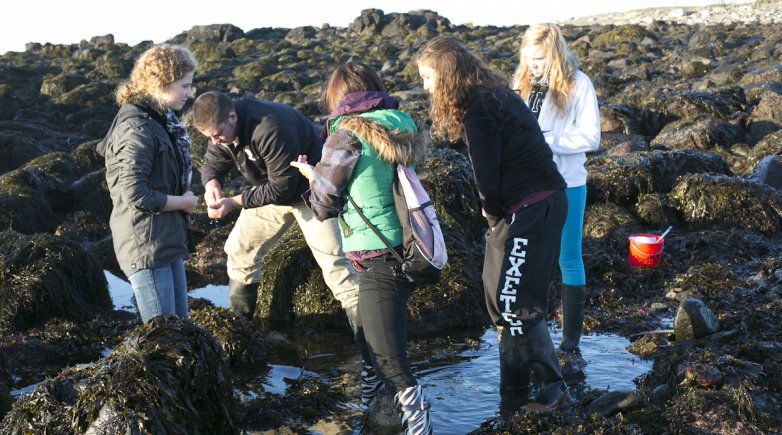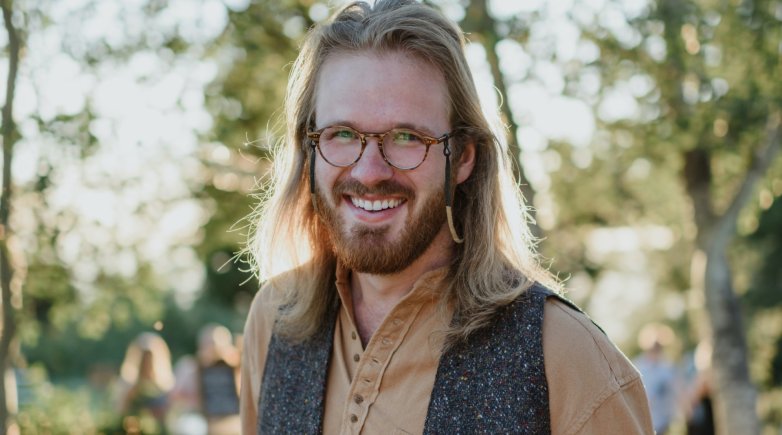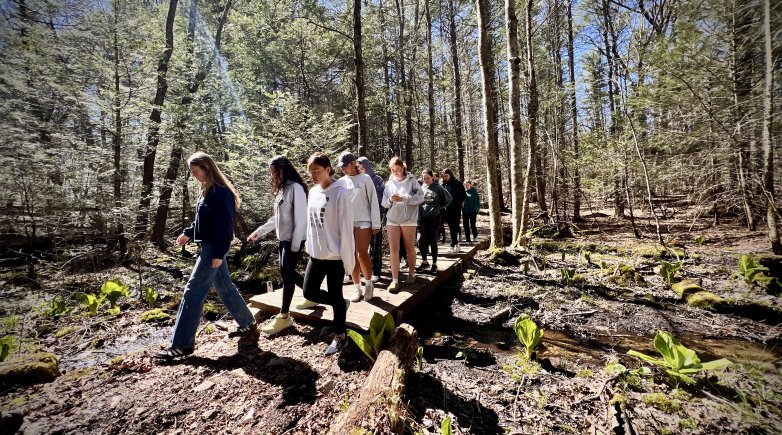Lindi von Mutius ‘99 “stumbled into” a career as an environmentalist. To be fair, her sincere interest in and curiosity about other cultures and a knack for science and research might have led her there eventually, but her Washington internship during her Exeter senior spring term kindled her passion for saving the planet and people.
Von Mutius shared that story and delivered remarks at assembly about having hope in the face of the climate crisis during a recent return to campus for her 25th class reunion. She is seven months into her latest challenge as the inaugural director of the Salata Institute Climate Action Accelerator at Harvard University. Before that, von Mutius was the director of the sustainability and global development practice graduate programs in the Harvard Division of Continuing Education
She has held leadership roles at the Trust for Public Land, the Sierra Club, and the Environmental Defense Fund. She has a bachelor’s from Williams College, a master’s in environmental management from the Harvard Extension School, and a J.D. from Vermont Law School.
We caught up with von Mutius after her assembly remarks to ask about her time at Exeter and the path she’s taken since (this conversation has been edited for length and clarity):
Let’s start with a little bit about your background. How'd you end up in Exeter?
I went to Dana Hall for middle school, and I was captain of the lacrosse team. Lee Young saw me play at an invitational tournament, and she asked me, “Do you know about Exeter? Would you want to come to Exeter?” I came up, I applied, and Exeter gave me a generous financial aid package. So that's how I wound up coming here.
What was your experience like here — and has your perspective of that experience evolved over time?
I think I've become more grateful for the experience over time. You never know what you have until afterward, especially when you're a teenager and you are not mature enough to appreciate what's happening to you at Exeter. … A lot of what Exeter taught me, I think, shaped me into the adult I am. Exeter raised me. Dr. (Sydnee) Goddard (instructor in biology) was a parent to me in the sense that I spent many evenings in her house, I babysat her kids, I watched her dog, and she let me do laundry as compensation for the babysitting. My other dorm parents, Mrs. Kemp, Ms. Girard, and Ms. Wolff, were all whose shoulders I could cry on or who would set me straight when I needed constructive feedback. The Greers, Mr. Weatherspoon, and Mr. Brandes all played parental roles in my life and invested in me. They welcomed me into their families and provided inspiration and encouragement. My friends at Exeter became closer to me than my siblings and helped shape my personality and perspective.
When did you develop a passion for the environment? Was there an “a-ha” moment?
One hundred percent. Environmentalism did not feel like a career opportunity for me until I did my Washington internship. It was funny, I really wanted to work on foreign policy because Senator Kerry was the head of the Senate Foreign Relations Committee, but two British interns had gotten there and staked out those spots in the office two days before I arrived. So, I got stuck with environmental policy. I was bummed, but within a week I thought, “this is awesome.” Environmental policy spoke to a lot of the things I cared about and I realized how interdisciplinary it was and that I could bring all of my language and cultural skills to this as well. Environmental work is done best when you bring your whole self to it.
Do you remember what you worked on?
George Abar, the legislative director at the time, and I worked on adding 300 miles of trails to the East Coast Greenway. In addition to a range of legislative research, he let me work on writing that bill, and when it passed in 2001, it was satisfying to see the results of that work in tangible protected trailways. You can now travel that trail from Calais, Maine to the Florida Keys. I also remember working on something around nuclear waste and toxics, which was also an issue that stuck with me into my legal career. George was the full stereotype of what you think of an environmentalist — Birkenstocks, a diesel-powered car, flannel. But, even though we were different, he showed me how I could be passionate about environmental protection in my own authentic way. When I think about the fact that he was pretty young himself, I think it left an impression on me that young people can make real change. I always tell people, so much legislation in America is written by 20-somethings!
Except you were only 18 or 17.
Exactly. 17. So yeah, watching that bill pass made me realize that environmental policy is what I want to do. So, I started at Williams wanting to do genetics and forensics, but I ended up as an environmental studies major.
What is a climate action accelerator?
The Accelerator is part of the Salata Institute for Climate and Sustainability at Harvard. Essentially, our mission is to take the research that Harvard faculty are developing and find homes for that research outside of Harvard and in the hands of practitioners. I'll give you a couple of examples. One of our professors, Dustin Tingley, has written a book “Uncertain Futures,” compiling years of research on how communities that have borne the brunt of major economic or labor transitions view government policies that intend to help those communities with the transition as lacking in credibility. After extensive interviews, he has formed strategies for how these policies could land better, helping to accelerate the clean energy transition we need to fight climate change. He wrote a 380-plus-page book. Awesome. But, busy policy practitioners who need to use those lessons don’t always have time to read the book. So, we are planning on hosting a distilled masterclass for those policy practitioners and also creating a bipartisan space for those practitioners to discuss their work with each other. Another example is our methane satellite. Harvard launched a satellite that provides incredibly granular data about methane emissions. But what are we doing with all the data? A team in the Methane Research Cluster has now developed a tool and the Accelerator will help connect them with practitioners who want to use it. I’m having conversations with researchers about how we can take their cutting-edge research on extreme heat and get that into the hands of communities that will be most affected by that in the next few years.
So, real-world application. And you’re the catalyst.
Yeah, a catalyst. Exactly. We’re trying to get this good work into the hands of people who can use it, and who can benefit from that research. It's really fun. It's the most fun job I've ever had because I'm learning about some cool new research at Harvard. So much is happening there and it's been really fun to build a team, figure out the strategy, and get going.
You were billed before your assembly remarks as a “climate optimist.” Is that an apt description?
The phrase climate optimism has come under fire as a privileged position. Wealthy people in wealthy countries who have access to academic institutions, tools, money, and power can be optimistic. If you're from the Republic of Micronesia, your country is potentially going to disappear in 50 years. So, the phrase “optimism” has come under fire by some activists as a very tone-deaf, privileged thing to say. I try to go with “hope” rather than optimism. As David Orr says, “Hope is a verb with its sleeves rolled up.” When I thought about these remarks, I felt worried about the trend evident in research by colleagues at Harvard Medical School that younger people can become quite pessimistic and anxious about climate change. Their future is scary and they are inheriting the bad choices generations ahead of them have made. These same researchers have found that engaging them in collective action is a good way to turn that anxiety and depression into positive action, and even joy. So, I shared with them my perspective that they have two choices: fight or flight. You can either flee, give up, or you can be like, “Nope, I will fight and I will work on this.” To usefully activate our fight response, the useful one, we have to work together. In 2009, psychologist Dennis Proffitt ran an experiment where he placed students wearing heavy backpacks at the base of a hill and asked them to estimate its steepness. Participants who stood next to a friend gave lower estimates of steepness than those who stood alone. The Harvard Medical School team found that climate anxiety is reduced when teenagers take climate action together. When we work together, we pick each other up. So, I hope more of them feel encouraged to become climate leaders. I am certainly here to cheer them on!



